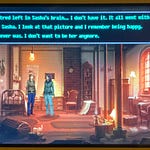Fire Emblem: Three Houses
By Nintendo
Released on Nintendo Switch in July 2019
I’ve never used a dating app. My ex-wife and I met in high school; I met my current partner at work. I’m also monogamous and not a hookup person. While I know plenty of folks my age who haven’t used the internet to find partners, I sometimes feel like there’s this quintessentially millennial experience that’s just beyond me. Which is fine, because that shit sounds exhausting, and I deal with enough intimacy-related anxiety.
My fiancée, Jess, and I got BFF tattoos when we were still just friends. During our marathon day of back-to-back sessions, we talked to our tattooer about relationships. Jess told us how she removed all mentions of video games from her OKCupid profile to weed out a certain kind of creep. Awkward boys all wanted the same thing: come over and play Xbox with me. But Jess wasn’t about to meet some rando for the first time at their house.
We had a lot of conversations about stranger danger.
Most video games are murder simulators. It’s fucking wild how many game designers just assume you’re cool with killing people in a virtual space. Tutorials teach you to wield a sword or fire a gun but elide the moral implications of taking a life. How it fractures your soul. How it changes you.
Fire Emblem: Three Houses acknowledges that war is hell, trauma is real, and sometimes you need counsel to confront what you’ve done. Then, in the denouement, it lets you marry one of your students. You’re all roughly the same age, and they’ve de facto graduated by this point, which I guess makes it okay? At least there are queer options. My female Byleth chose Dorothea, an opera-singing pauper turned mage. Imagine my surprise in the tower when she first got flirty. Pitter-pat went my gay-ass heart.
Maybe relationship simulators could teach empathy if they weren’t so fucking transactional. It’s hard to think outside the paradigm of scorekeeping when all game mechanics boil down to if this, then that. What incentive would there be to give Lady Rhea an owl feather if it didn’t raise your stats?
One answer is story. Cut scenes give us glimpses into the lives of the dozens of NPCs you can teach, recruit, befriend, or wed. We learn about arranged marriages, blended families, nobility, and scandal. We find out who writes children’s stories, who’s afraid of ghosts, who’d rather be a painter than a warrior. The game invites us to care about the characters’ humanity as much as their dex and charm scores. It makes the world richer. It makes their deaths harder to bear.
Before we were together, Jess told me that apps like Tinder and Bumble skeeve her out on, like, a foundational level: people consider who they want to fuck based on little more than a selfie. Which, of course, isn’t how everyone uses those apps—and there’s nothing wrong with consensual hookups—but I can see how that would be a gross proposition for someone who’s asexual and looking for friends more than anything.
At one of her work events, I met Jess’s nineteen-year-old intern G., who studies animation and video game design. While we made small talk, I told her I’d been playing a lot of Fire Emblem. She scoffed. Thrown off guard, I invoked Life Is Strange and Celeste to save face. G. approved, but the damage was done. I felt so old and uncool, grasping for something to bridge the gap between me and someone twenty years younger. Why did it matter? I should have held my ground. I should have scoffed back: I’m thirty-nine years old, and Fire Emblem rules.














Share this post